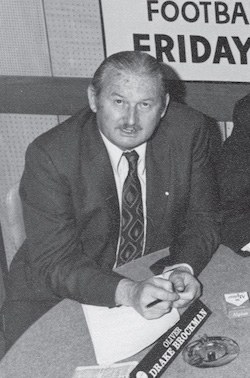|
HALL OF FAME INDUCTEE Oliver Drake-brockman |
|
|---|---|
| Year Inducted | 2015 |
| Date of Birth | 11th January 1923 |
Media 1954-1973
Representative: Radio commentator and pioneer of the football talk back format
Oliver Drake-Brockman was a pioneer and master craftsman of radio football commentary in Western Australia. The inspiration and influence that he had upon a generation of subsequent media figures stamps him as one of the most important broadcasters in the history of West Australian football.
His infectious staccato style of delivery and heightened sense of the dramatic captured the imagination of listeners and his detailed preparation and attention to accuracy left a lasting impression on subsequent major media figures such as Frank Sparrow, Neil Garland, George Grljusich and Dennis Cometti.
Oliver Drake-Brockman was born in Rabaul, Papua New Guinea where his father Karl was serving as a magistrate. The family returned to Perth soon after and Oliver grew up in Guildford. When attending Guildford Grammar School, he excelled at football, cricket and athletics and he was sufficiently talented at football to earn a league game for Swan Districts in 1941. When the second World War caused a hiatus in senior competition, Oliver enlisted in the army and afterwards joined motor vehicle company Attwoods in a clerical role.
A love of baseball inadvertently launched his broadcasting career for after helping to establish night baseball at the WACA ground in 1954, Oliver personally called the action over a PA system. His style attracted the interest of 6PR executives who needed an anchor for their new WAFL coverage and he joined the station full time as a programmer and football caller. Thus began a legendary career in WA radio.
From the outset Drake-Brockman was in control, exuding confidence and handling difficult broadcasting situations with ease. He brought to his football commentary the great strengths of infectious enthusiasm and a very thorough understanding of the game and the players. He made a point of getting to know the players and their work and family background which enabled him to infuse his calls with colour and interest. Neil Garland said that “Ollies colourful descriptions of the play and his summing up during and after the game were works of art.”
In about 1957, Oliver was joined on 6PR by a protégé in Frank Sparrow and their lively partnership facilitated innovation that attracted a new audience to the game. The station instigated the first football talk back show on Saturday nights and players were encouraged to appear live. This pioneering innovation was recognised in the now defunct Daily News after Drake-Brockman passed away in 1979 with the headline “Talk-back Ollie passes away.”
Like many broadcasters, Oliver Drake-Brockman could also turn his microphone to other sports with excellent facility. He called athletics, boxing, yachting and rowing, among others and Herb Elliott’s gold medal winning 1500m race at the 1960 Rome Olympics was called by telephone from his home after listening to the BBC commentary on shortwave radio.
Australian Rules football was his main passion however, and he called the sport for the ABC as well as 6IX and 6KY in the 1970’s before retiring after more than 20 years on air. His skill was recognised Australia wide and VFL identity Ron Casey once tried unsuccessfully to attract Oliver to Melbourne, even offering him a clothing allowance despite all the proposed work being on radio.
The influence that Oliver Drake-Brockman had upon football broadcasting in Western Australia has been attested to by many. It was Oliver who was largely responsible for launching the long and highly successful career of Frank Sparrow as a football broadcaster and Dennis Cometti spent one WAFL season (1973) with Oliver on 6PR. He has said that “Oliver was blessed with a marvellous voice and he was the first broadcaster from my youth to capture my imagination. He had a great sense of the dramatic and understood radio. From him I learnt that a little poetic license was a valuable tool.”
The extent of Oliver Drake-Brockman’s involvement in football went well beyond the commentary box. He was for instance also involved in the establishment of the Applecross Junior Football Club and was president in 1969.
Oliver Drake Brockman passed away at the age of only 56 in 1979. He might be pleased to see how important the audio visual media has become in the modern football landscape as he becomes the fifth member of the fourth estate to join the West Australian Football Hall of Fame.



